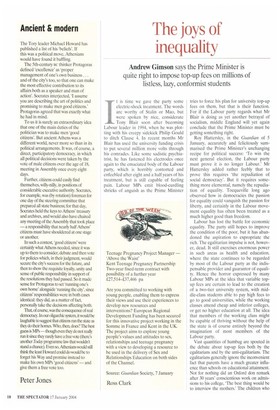The Tory leader Michael Howard has published a list of
his 'beliefs'. If this was a political move, Athenians would have found it baffling.
The 5th-century BC thinker Protagoras defined 'excellence' as 'proper management of one's own business.,, and of the city's too, so that one can make the most effective contribution to its affairs both as a speaker and man of action'. Socrates interjected, 'I assume you are describing the art of politics and promising to make men good citizens.' Protagoras agreed that was exactly what he had in mind, To us it is surely an extraordinary idea that one of the main duties of the politician was to make men 'good citizens'. But ancient Athens was a different world, never more so than in its political arrangements. It was, of course, a direct, participatory democracy, in which all political decisions were taken by the vote of male citizens over the age of 18, meeting in Assembly once every eight days.
Further, citizens could easily find themselves, willy-nilly, in positions of considerable executive authority. Socrates, for example, was (by rotation) foreman for one day of the steering committee that prepared all state business; for that day, Socrates held the keys to Athens' treasury and archives, and would also have chaired any meeting of the Assembly that took place — a responsibility that nearly half Athens' citizens must have shouldered at one stage or another.
In such a context, 'good citizens' were certainly what Athens needed, since it was up to them to consider, debate and then vote for policies which, in their judgment, would secure the city's success for the future, and then to show the requisite loyalty, unity and sense of public responsibility in support of the resolutions they had passed. So it made sense for Protagoras to set 'running one's own home' alongside 'running the city', since citizens' responsibilities were in both cases identical: they did, as a matter of fact, personally take the decisions affecting both.
That, of course, was the consequence of real democracy. In our oligarchic system, it would be laughable to suggest that citizens ran the state as they do their homes. Who, then, does? The best guess is MPs — though even they do not really run it since they rarely have a free vote (there's another Today programme law that wouldn't stand a chance). Even so, Athenians would still think the least Howard could do would be to forget his Way and promise instead to make his own MPs 'good citizens' — and give them a free vote too.


































































 Previous page
Previous page